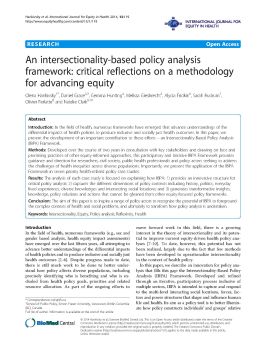An intersectionality-based policy analysis framework: Critical reflections on a methodology for advancing equity
This important resource offers a structured way to critically appraise health policies using an intersectionality approach. Other frameworks have been developed to understand how various health policies consider independent social and structural determinants of health; however, they often exclude consideration of when the determinants intersect or intertwine. An intersectionality lens enables “researchers, civil society, public health professionals and policy actors” to rethink social injustices. It encourages those to not only think of individual social categories (ex: sexuality, ‘race’/ethnicity, class, etc.), but to examine the relationship between social categories, and the impact this has on in/equities. The IBPA framework provides structure for critical policy analysis, considers various oppressive determinants simultaneously, and provides innovative solutions. Using the framework supports critical policy analysis through two components: guiding principles (intersecting categories, multi-level analysis, power, reflexivity, time and space, diverse knowledges, social justice, and equity) and overarching questions to help shape the analysis.
Use this resource to:
- Learn about equitable critical policy analysis using intersectionality lens
- Consider different dimensions of policy contexts including history, politics, everyday lived experiences, diverse knowledges and intersecting social locations; and
- Generate transformative insights, knowledge, policy solutions and actions that cannot be gleaned from other equity-focused policy frameworks.
Related Resource:
Reference
Hankivsky, O., Grace, D., Hunting, G., Giesbrecht, M, Fridkin, A., Rudrum, S., Ferlatte, O. & Clark, N. (2014). An intersectionality-based policy analysis framework: Critical reflections on a methodology for advancing equity. Int J Equity Health. 13(119).doi:10.1186/s12939-014-0119-x.
Tags: Healthy public policy, Methods & tools, Intersectionality, Participate in policy development, Journal Article
